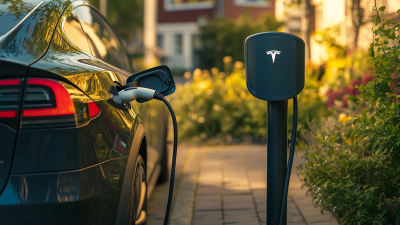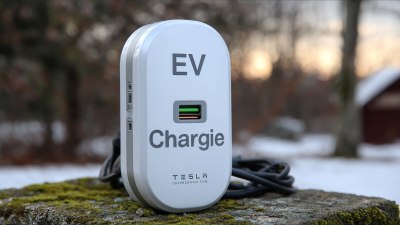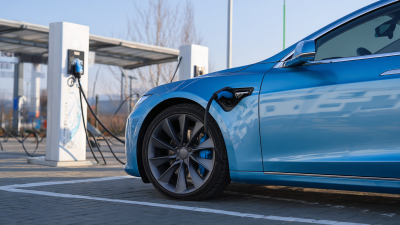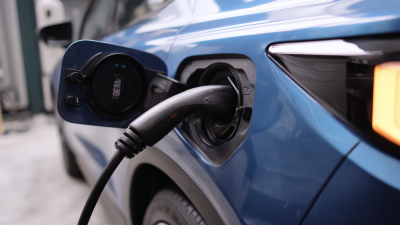As the demand for electric vehicles continues to rise, businesses are increasingly looking to invest in EV Charger Type 2 solutions to meet the needs of their customers and employees. However, choosing the right charger can be a daunting task, given the myriad of options available in the market. This blog will guide you through the essential considerations for selecting the most suitable EV Charger Type 2 for your business, ensuring that you not only enhance your sustainability efforts but also provide convenience and efficiency for electric vehicle users.

From understanding the technical specifications to evaluating installation requirements and integrating the charger into your existing infrastructure, we'll cover everything you need to make an informed decision that aligns with your business goals. Join us as we explore the key factors to consider when selecting an EV Charger Type 2 that meets your specific business needs.
When selecting an EV charger for your business, it's essential to understand the various types available, particularly Type 2 chargers, which are prevalent in commercial settings. Type 2 chargers are designed to cater to a wide range of electric vehicles, making them a versatile choice for businesses that encounter diverse fleets. They typically offer varying charging speeds, ranging from slow to fast, depending on the power supply and vehicle compatibility. Understanding these charging levels can significantly impact your operational efficiency, as businesses need to ensure that their vehicles are charged in a timely manner.

It's also critical to consider the installation and maintenance aspects of Type 2 chargers. These chargers come with different cable lengths and connector types, which can affect installation requirements based on your specific site layout. Moreover, incorporating smart charging solutions can help your business monitor usage and manage energy costs effectively. By carefully evaluating the types of EV chargers and aligning them with your business's demands, you'll be able to create an efficient and sustainable charging infrastructure that meets both current and future needs.
When selecting the right Type 2 EV charger for your business, understanding your specific charging needs is crucial. Start by evaluating your customer demographics and the average length of their stay. For instance, if your business frequently accommodates customers with longer visits, such as at a shopping center or restaurant, installing a Level 2 charger can provide the necessary charging time. Conversely, businesses with a quick turnover, like convenience stores, might benefit more from fast-charging options to ensure rapid vehicle turnover.
Another important factor to consider is the size of your fleet, if applicable. Businesses operating a fleet of electric vehicles should assess the total daily mileage and charging cycle of each vehicle. This will help determine whether you need multiple chargers or a combination of different charger types to meet varying charging times and styles. Additionally, consider the location and installation costs, as well as potential future expansion, which will influence the type and number of chargers you choose to invest in for optimal efficiency and accessibility.
When selecting Type 2 EV chargers for commercial use, there are several key features that business owners should prioritize. First and foremost, charging speed is essential. Type 2 chargers typically offer varying levels of power output, so choosing a model that provides fast charging capabilities can significantly enhance customer satisfaction and minimize downtime. Look for chargers with higher kilowatt ratings, as these can quickly recharge vehicles, making them particularly beneficial in busy environments.
Another crucial factor to consider is connectivity and integration. Modern Type 2 chargers often come equipped with smart technology, allowing businesses to monitor usage patterns, manage energy consumption, and even facilitate payments. Opting for chargers that support mobile apps or cloud-based management systems can streamline operations and provide valuable data insights, enabling businesses to optimize their charging stations.
Additionally, ensure that the chargers are designed with durability in mind, suitable for high-traffic areas, and compliant with local safety standards to guarantee longevity and reliability in your commercial setup.
When evaluating the investment for Type 2 EV chargers, businesses need to consider both upfront costs and long-term benefits. According to the International Energy Agency (IEA), the global market for electric vehicle (EV) chargers is expected to grow significantly, with Type 2 chargers becoming a standard in many regions due to their compatibility with a wide range of vehicles. The average installation cost for a Type 2 EV charger can range from $2,500 to $5,000, which includes both hardware and installation. Additionally, businesses must factor in maintenance costs, which can be around $200 annually, impacting the overall budget.

A detailed cost analysis reveals that investing in Type 2 chargers can lead to significant savings over time. The U.S. Department of Energy estimates that installing EV chargers can increase property value by up to 30%, while also attracting eco-conscious customers. Furthermore, with incentives such as tax credits and rebates available in various regions, the return on investment can be realized faster than expected. As more businesses adopt EV charging solutions, the operational benefits—including increased foot traffic and enhanced brand loyalty—further justify the initial expenditure. Thus, a careful evaluation of these costs versus potential gains is essential for any business considering the adoption of Type 2 EV chargers.
As electric vehicles (EVs) gain traction in the market, businesses must consider future-proofing their operations by investing in the right EV charging solutions. According to a report by Bloomberg New Energy Finance, it is projected that by 2040, over 550 million electric vehicles will be on the roads worldwide, prompting an urgent need for reliable charging infrastructure. Selecting the appropriate EV charger Type 2 not only supports the growing demand but also enhances overall business sustainability.
When choosing an EV charger, businesses should assess their current and future electrical needs. Consider the charging speed, as Type 2 chargers typically offer both single-phase and three-phase options, with charging times varying significantly. This flexibility allows businesses to future-proof their investment by accommodating a range of EV models and charging capabilities. Additionally, incorporating smart charging solutions can optimize energy consumption and reduce operating costs.
Tips:














